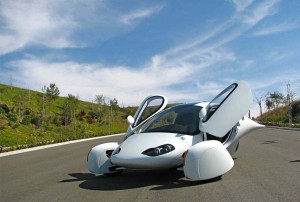
Aptera's little battery car won't be making it into production as the California start-up shuts its doors.
After raising only a fraction of the money it needed to put its aircraft-like 2e battery-car into production, California start-up Aptera has had to pull the plug on its ambitious goal of becoming a major player in the coming market for electric vehicles.
The Southern California firm had been counting on receiving a federal loan to cover most of the $150 million it said it needed to launch production of the three-wheeled, highly aerodynamic 2e, which looks much like a private aircraft minus the wings.
But the government failed to come up with funding as the Department of Energy loan program came under increasing fire – an issue that saw the DoE back out of assisting another California automotive ‘s goalstart-up, San Diego-based Next Autoworks. (Click Here for that story.) Turning to other sources, Aptera had so far only been able to raise $40 million.
“After years of focused effort to bring our products to the market, Aptera Motors is closing its doors, effective today,” Aptera Chairman Paul Wilbur said in a statement announcing the battery-car maker’s decision. “This is a difficult time for everyone connected with our company because we have never been closer to realizing our vision. Unfortunately, though, we are out of resources.”
The collapse of Aptera sends a bad signal to the nascent electric vehicle market – which is generating plenty of headlines but relatively few sales.
The Obama Administration has set a goal of promoting the sale of 1.5 million battery vehicles – which include both plug-in hybrids and those running solely on electric propulsion – by 2015. But the market is getting off to a slow start.
The two main electric vehicles now on the market, the Nissan Leaf and Chevrolet Volt, have been generating only modest demand. After a slow start, Chevy has seen sales pick up in recent months, but the maker will still miss its goal of 10,000 sales for 2011. The Leaf will likely hit its own 10,000 unit target – but sales have slowed sharply during the last two months.
Meanwhile, senior GM officials have acknowledged that the Chevrolet Volt could be in for a significant setback due to wide coverage of a trio of fires that have occurred in vehicles used for federal crash tests. The National Highway Traffic Safety Administration has launched an investigation, though there is some evidence the fires may have been caused by NHTSA engineers failing to follow protocol after the crashes.
Hoping to stem criticism, GM CEO Dan Akerson this week said the maker would buy back Volts if owners were worried about the potential problem – which has so far not been experienced by any of the plug-in hybrids in real-world use. (For the latest on the Chevy Volt story, Click Here.)
Nonetheless, most major manufacturers have been cautiously entering the battery space. Ford will begin marketing the new Focus Electric this month, while Toyota will launch a plug-in version of its Prius hybrid and follow next year with a pure battery-electric model.
But a number of small manufacturers have been hoping to use the dramatic shift from conventional to electric powertrain technology as an opportunity to enter the long-closed automotive market. Two makers who have benefited from federal loans are California’s Tesla Motors –which will introduce the battery-powered Model S sedan in 2012 – and plug-in hybrid maker Fisker Automotive.
Others who haven’t landed DoE loans are considered to have much more risky futures.
While it did have some investors in place, Aptera CEO Marques McCammon told USA Today it couldn’t find the deep-pocket backers to offset the loss of government assistance, so, “We’re just going to go through the process of dissolving.”
